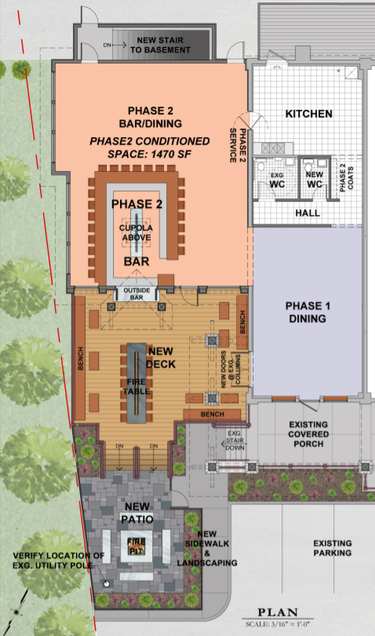Public hearing set for Altamont Corners expansion
— From Jeff Thomas
Curry Patta, which opened in Altamont Corners last fall, is looking to expand its operations. If approved by the planning board, the now-1,200 square-foot Pakistani restaurant would receive a 1,470-square-foot enclosed addition along with a wooden deck and stone patio that, taken together, would add about 1,500 square feet to the project.
ALTAMONT — Issues about access for and safety of people with handicaps were among the topics of discussion of the planning board here on a proposal to add indoor space and alfresco dining to a restaurant at Altamont Corners.
The Altamont Planning Board on Tuesday set a March 22 public hearing for the proposed expansion of the recently-opened Curry Patta restaurant.
If approved, the now-1,200 square-foot Pakistani restaurant would receive a 1,470-square-foot enclosed addition along with a wooden deck and stone patio that, taken together, would add about 1,500 square feet to the project.
Since the plaza is owned by Jeff Thomas, the building addition would be an amendment to the existing special-use permit he holds on the building, not the permit of Nadia Raza, the owner of Curry Patta.
The project was considered a Type II Action under the State Environmental Quality Review Act, meaning the board determined the addition would not have a significant adverse impact on the environment.
But, Chairwoman Deb Hext said, “I know we had a lot of questions on this.”
Board members had concerns that, by expanding the restaurant, some parking would be eliminated. Their concerns were allayed by Donald Cropsey, speaking on behalf of Thomas, who said that the only change in parking would be the addition of a handicap parking space.
Cropsey said that the additional handicap parking spot would be added to the rear of the building, and it was noted that adding the spot in the back of the building was counterintuitive to the point of handicap parking — easy access to the front entrances of businesses for people with mobility issues.
After some more discussion, it was agreed that the additional handicap parking spot would be placed in the front parking lot.
A separate handicap concern was also brought up later in the meeting.
Hext said there was no egress from the proposed deck to the parking lot or sidewalk in case of an emergency for a person with handicaps.
“I just think that’s an oversight, I think it’s dangerous, I wouldn’t want to be the person that approves a site plan and has something happen, and a handicap person not be able to get out,” Hext said.
Cropsey said, with respect to egress from the deck, there were three ways to exit the deck: through the restaurant; through the existing front porch of the plaza, noting it was “probably 12-feet wide”; and through the patio into the parking lot.
But none of the three options had a ramp so that a person in a wheelchair could leave the deck.
Board members felt that a ramp was needed.
And, after the deck was described as an “area of refuge,” meaning the area in a high-rise building designed to protect people in fire or other emergency, and after 9/11 was invoked, it was agreed that a ramp would be installed.
Board member John Hukey wanted to know about live music that would be played at the restaurant. “Are we going to have all kinds of loud music … we’ve got to have some kind of control over what type of venue it’s going to be,” Hukey said.
Cropsey said he spoke with Thomas, who told him there may be “jazz music inside” the restaurant, light music, perhaps a jazz trio on the deck, “cultural music consistent with the type of food that’s being sold.”
Cropsey continued, “But I don’t believe that it’s going to be loud, obtrusive music.”
Hukey wasn’t questioning what was Cropsey was saying, he said, but he wanted to know what Raza was actually going to end up doing, “if we don’t have something in place to have a say about it.”
Cropsey said that could be addressed at the public hearing, and that he could get more information about the type of live entertainment at the restaurant.
Hext noted that the board could set hours and days at which music could be performed. She noted, for example, “if we ever get back to whatever normal is,” a conflict could arise between live music at Curry Patta and and functions at the neighboring Altamont Free Library or music in Orsini Park on Tuesday nights.
Raza was out of town and unable to access the virtual meeting, but called Altamont’s building inspector, Lance Moore, mid-meeting to tell him that the restaurant closes at 10 p.m., and everything else “ceases by 11 o’clock.” Moore said that Raza would “come back to the board with a proposal for your review and determination.”
Altamont doesn’t have its own noise ordinance; it goes by the town of Guilderland’s ordinance, Hext said, because the village’s police department stops its patrol at 11 p.m., and most noise-disturbance calls come in after that time, so those calls are routed to the Guilderland Police Department.
Hext said she reached out to the railroad; the tracks that run alongside the plaza are owned by Norfolk Southern. “Although, ideally,” Hext said, the company would like the building to be 50 feet away from the center of the tracks, there is no standard that Norfolk Southern sets — which most rail companies seem to have.
Other business
In other business, the planning board also set March 22 public hearings for a minor subdivision of land owned by Troy Miller at 130 Main Street, and on the special-use permit application for Gary and Crystal Goss to install a pool in their side yard at 13 Maiden Pass.


